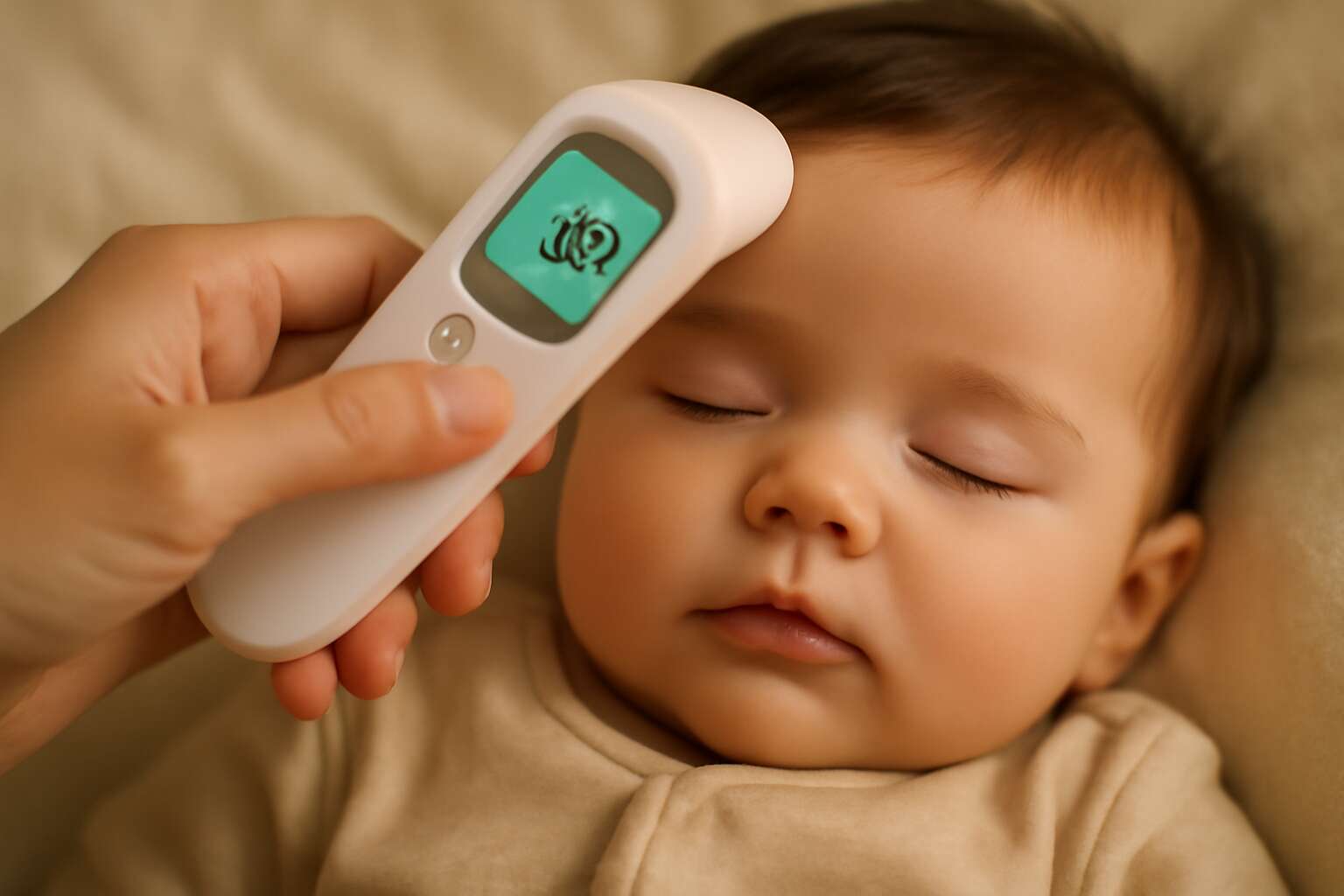Understanding Baby Temperature Measurement
Types of Baby Thermometers
Understanding how to measure a baby’s temperature is both an art and a science—an intricate dance between technology and trust. When considering which thermometer is more accurate for babies, it’s crucial to recognize the various types available, each with its own nuances and precision levels.
Digital thermometers are widely favored for their quick readings and ease of use. They can be used orally, rectally, or axillary, offering flexibility but also requiring careful technique to ensure accuracy. Infrared thermometers, on the other hand, provide non-contact readings, which are convenient but can sometimes sacrifice precision if not used correctly. Ear thermometers, or tympanic devices, measure the temperature inside the ear canal, giving rapid results but with variable accuracy depending on proper placement.
Ultimately, the choice hinges on understanding these distinctions—because when it comes to which thermometer is more accurate for babies, precision can be a matter of life and comfort.
How Baby Body Temperature Is Measured
When it comes to gauging a tiny human’s temperature, precision isn’t just a matter of convenience—it’s a matter of health. Surprisingly, studies reveal that up to 25% of temperature readings can be off due to improper technique or the type of thermometer used. This underscores a vital question: which thermometer is more accurate for babies? The answer isn’t straightforward, but understanding how temperature is measured in little ones can shed much-needed light.
Baby body temperature can be assessed through several methods, each with its own delicate intricacies. Rectal thermometers, for example, are often considered the gold standard for accuracy because they measure core body temperature directly. Conversely, axillary (armpit) readings tend to be less precise but are gentler for the baby and easier for parents to manage. Ear thermometers, or tympanic devices, offer rapid results but demand meticulous placement; a slight misalignment can skew the results significantly.
In essence, the debate about which thermometer is more accurate for babies hinges on balancing precision with practicality. After all, a tiny shift in temperature measurement can influence crucial health decisions—so choosing the right device is an act of both science and gentle art.
Evaluating Accuracy in Baby Thermometers
Factors Influencing Temperature Accuracy
When it comes to evaluating which thermometer is more accurate for babies, precision isn’t just a luxury — it’s a necessity. The stakes are high; even a slight deviation can lead to unnecessary panic or missed signs of illness. Factors that influence temperature accuracy include the placement of the thermometer, the device’s calibration, and the method used. For example, infrared thermometers might be quick and non-invasive but are often more susceptible to environmental interference, impacting their reliability. Conversely, digital thermometers placed under the tongue or ear tend to offer more consistent readings if used correctly. It’s also vital to consider the device’s response time and whether it accounts for the baby’s movement, which can skew results. Many parents struggle with this dilemma, but understanding which factors affect accuracy can simplify the decision process. After all, knowing which thermometer is more accurate for babies can mean the difference between peace of mind and unnecessary worry.
Comparison of Different Thermometer Types
When evaluating which thermometer is more accurate for babies, the subtle dance of precision becomes paramount. Each type whispers its own story—some gentle and swift, others steadfast and deliberate—yet the question remains: which offers the truest reading? Infrared thermometers, with their lightning-fast responses, can be misleading if environmental factors—like ambient temperature or moisture—interfere. Digital thermometers, especially when used correctly under the tongue or ear, tend to deliver more consistent and reliable results. But beware: even the most sophisticated device falters if not calibrated or used with care.
Understanding the nuances of each thermometer type reveals that the quest for accuracy often hinges on the device’s design and the method of measurement. For those seeking the most dependable results, some prefer digital thermometers for their stability, while others opt for the quick convenience of infrared options. Ultimately, the answer to which thermometer is more accurate for babies depends on meticulous use and thoughtful choice, ensuring peace of mind amid the unpredictable tides of little one’s health.
Clinical Studies and Expert Recommendations
Clinical studies have illuminated a fascinating truth: no single thermometer reigns supreme in absolute accuracy for babies. Instead, the reliability often hinges on rigorous testing and validation of the device under real-world conditions. Researchers compare readings across diverse scenarios—ambient temperature fluctuations, different measurement sites, and even the baby’s activity level—to determine which thermometer is more accurate for babies. The results consistently show that digital thermometers, especially when used correctly, tend to produce more stable and trustworthy measurements than some infrared models, which can be swayed by environmental factors.
Expert recommendations further shed light on this delicate quest for precision. Pediatricians often emphasize that the choice of thermometer should align with proper technique and consistent calibration. For instance, digital ear thermometers are praised for their reliability when used properly, while infrared options gain favor for their speed—though they require careful attention to environmental conditions. Ultimately, the consensus remains clear: careful use and informed selection are key to discovering which thermometer is more accurate for babies, ensuring peace of mind for parents and caregivers alike.
Safety and Practicality Considerations
Safety of Baby Thermometers
When it comes to safeguarding your tiny human’s health, safety and practicality are the top contenders. After all, no parent wants to wrestle with a thermometer that turns into a medieval torture device. Choosing which thermometer is more accurate for babies isn’t just about pinpoint precision; it’s about peace of mind wrapped in a child-proof package. Safety features like soft, flexible tips for rectal thermometers or non-invasive, quick-read options for forehead thermometers can make all the difference. Remember, a thermometer that’s unsafe or difficult to use might lead to inaccurate readings—hardly the goal when you’re trying to gauge whether your little one has a fever or just a mischievous spike of curiosity.
Practicality also plays a crucial role. Instruments that are easy to operate, wipe clean, and store without fuss are invaluable in the chaos of parenting. Some models come with protective covers or are designed to be waterproof, ensuring longevity and hygiene. To help clarify, here’s a quick rundown of what to look for:
- Non-toxic, BPA-free materials for safety
- Ergonomic design for quick, accurate readings
- Ease of calibration and maintenance
Ultimately, the best choice balances accuracy with safety, ensuring parents can confidently select which thermometer is more accurate for babies without sacrificing practicality. After all, when dealing with a tiny tempest of toddler tantrums, simplicity and security are worth their weight in gold.
Ease of Use for Parents
When it comes to caring for your little one, ease of use becomes just as vital as accuracy. A thermometer that is straightforward and intuitive can make all the difference during those frantic moments when every second counts. Parents often find themselves juggling sleepless nights and endless diaper changes, so a device that simplifies temperature readings is invaluable. The best models feature large, clear displays and minimal buttons, allowing even sleep-deprived parents to quickly determine their baby’s temperature without fuss.
Safety remains paramount, too. Thermometers with soft, flexible tips or non-invasive designs tend to be more parent-friendly, reducing discomfort for your baby and making the process more manageable. An important aspect to consider is how easy it is to clean and maintain the device. Waterproof thermometers, for instance, can be wiped down easily, ensuring hygiene is never compromised. Ultimately, the question of which thermometer is more accurate for babies hinges on those that blend simplicity with safety, giving parents peace of mind during those crucial moments.
Cost and Maintenance
When considering safety and practicality, the cost of a thermometer becomes a vital factor for parents. A device that is affordable yet reliable can save money without sacrificing accuracy, which is essential when asking, which thermometer is more accurate for babies? Safety features like soft, flexible tips or non-invasive designs ensure that your little one’s comfort is prioritized during every measurement. These features reduce the risk of injury and make the process less stressful for both parent and child.
Maintenance is another practical concern. Waterproof thermometers stand out because they are easy to clean and disinfect, ensuring hygiene is never compromised. For busy parents, this convenience can be a game-changer. Additionally, choosing a model with durable, easy-to-replace batteries or simple calibration options adds to the device’s practicality. Ultimately, the most accurate thermometer for babies combines safety, ease of maintenance, and cost-effectiveness—an all-in-one solution for peace of mind in demanding moments.
Choosing the Most Accurate Thermometer for Your Baby
Recommended Thermometer Types for Precise Readings
Choosing the most accurate thermometer for your baby demands more than just selecting a device; it’s about understanding the subtle nuances that influence precise readings. When pondering which thermometer is more accurate for babies, many parents overlook the importance of measurement site and technology.
For instance, digital ear thermometers, renowned for their quick readings, excel in providing close-to-core temperature data, especially when used correctly. However, they can be susceptible to the angle of insertion and earwax, which may introduce discrepancies. Conversely, temporal artery thermometers, which scan the forehead with infrared sensors, often deliver reliable results with minimal fuss, making them ideal for active infants.
In the quest to determine which thermometer is more accurate for babies, the answer often hinges on the context of use and the specific needs of the infant. Precision isn’t solely about the device but also about how consistently it is used and calibrated.
Tips for Ensuring Accurate Temperature Readings
In the shadowed realm of infant care, where every flicker of a thermometer’s reading can spell the difference between health and peril, understanding which thermometer is more accurate for babies becomes a quest of paramount importance. To ensure precision, one must look beyond mere device choice and delve into the subtle art of technique and consistency. The whisper of infrared sensors and the delicate placement of probes hold secrets that can skew even the most advanced technology.
Ensuring accurate temperature readings demands vigilant calibration and proper use. For instance, when using an ear thermometer, angle and cleanliness can sway the results, while forehead scans require steady positioning and minimal movement. Remember, the most reliable readings emerge not solely from the device but from the caregiver’s meticulous attention to detail. After all, in the pursuit of truth within the tiny, fragile bodies of infants, precision is a dance between science and careful human touch.
When to Consult a Pediatrician
Choosing the most accurate thermometer for your baby is a delicate dance between science and intuition. In a world where a single degree can signal a turning point between wellness and concern, discerning which thermometer is more accurate for babies becomes a matter of both knowledge and trust. The truth is, no single device holds all the answers; instead, it’s about understanding how each instrument interacts with the tiny, fragile bodies we seek to protect.
When contemplating which thermometer is more accurate for babies, consider how different measurement methods impact reliability. Digital thermometers, especially those designed for rectal use, often provide the most precise readings—crucial when every fraction of a degree matters. Meanwhile, infrared thermometers, while quick and hygienic, require meticulous technique to avoid skewed results. The key lies in consistent use and proper calibration. Sometimes, the most advanced device can falter if not handled with care, highlighting the importance of caregiver vigilance.
Ultimately, parents and caregivers should remain vigilant and recognize when to consult a pediatrician. If readings fluctuate wildly despite careful use, or if the baby exhibits concerning symptoms, professional advice becomes indispensable. Remember, in the quest to determine which thermometer is more accurate for babies, patience and attention to detail are as vital as the technology itself.



0 Comments